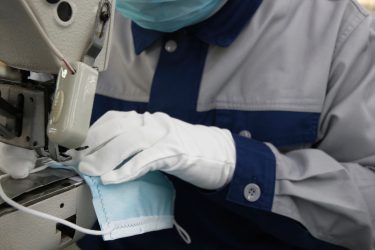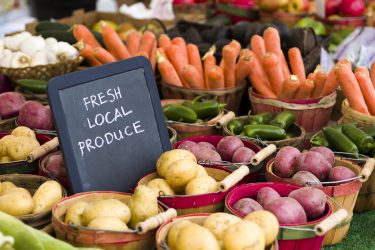The potential legal pitfalls of COVID-19
- Like
- Digg
- Del
- Tumblr
- VKontakte
- Buffer
- Love This
- Odnoklassniki
- Meneame
- Blogger
- Amazon
- Yahoo Mail
- Gmail
- AOL
- Newsvine
- HackerNews
- Evernote
- MySpace
- Mail.ru
- Viadeo
- Line
- Comments
- Yummly
- SMS
- Viber
- Telegram
- Subscribe
- Skype
- Facebook Messenger
- Kakao
- LiveJournal
- Yammer
- Edgar
- Fintel
- Mix
- Instapaper
- Copy Link
Posted: 11 May 2020 | Bethan Grylls (New Food) | No comments yet
New Food’s Editor interviews two lawyers from Squire Patton Boggs on the changes occurring in the food industry, the possible consequences of good intentions, and some of the measures that can help protect your business now and moving forwards.


“We have seen a distinctive split in the impacts coronavirus has had on the food and beverage market,” Nicola Smith, the Director of global law firm, Squire Patton Boggs, told New Food.
“From a manufacturing and supermarket point of view, the industry has faced unprecedented demand from consumers, particularly for some products such as flour and eggs. While the shortage of staff due to isolation has added further pressure on the industry, as efficiency levels are challenged.”
Smith also mentioned concerns expressed by some over border issues, from getting produce across countries, to the different approaches authorities are taking with documentation.
On the other side of the spilt, the hospitality market has been hit hard due to the enforced closures of bars and restaurants. “That demand has fallen off a cliff,” Smith stated. “It’s even more pronounced because we don’t know when that particular lockdown is going to end. The expectation is that that hospitality sector will probably be one of the last markets to come out of lockdown.”
Echoing the opinion of many New Food has spoken to, Simon Garbett, a Partner at Squire Patton Boggs, pointed out that the pandemic has also revealed the importance of the food industry to consumers. “You suddenly realise how dependent you are on these items normally taken for granted.”
Changes in the food industry
Best practice takes a step back
The pandemic has also led to some best practice models, which have proved too restrictive during the outbreak, to be eased temporarily. Smith gave an example: “The government announced a relaxation of some of the competition law requirements placed on the dairy sector due to surplus milk that was originally intended for the hospitality industry.”
The world has also seen businesses turning to novel processes, for example those with excess capacity have looked to produce something entirely different. “There have been reports of Cadbury’s looking at PPE, for example. We have also witnessed a lot of drink producers looking to produce hand sanitiser. While some wholesalers, such as Brakes and Bidfood, have opened up their services to the general public.”
Employment
During the early stages of lockdown, the lawyers told New Food that the firm was working with a number of clients that were “crying out for workers”.
“We are seeing former competitors coming together to work through the crisis, and suppliers relying on similar people and joined up solutions, including shared logistics, to assist deliveries,” Garbett said.
As a result of novel collaborations, the duo said these businesses have now managed to overcome some of the strain on their workforce by enlisting the help of furloughed staff from other sectors of the industry.
“There are agencies that have job boards specially designed to match the retail sector with the manufacturing sector,” Smith explained.
Supply and demand
“I have been asked by global suppliers with excess stock in one area for advice on the requirements to move that stock to a different country where there are shortages,” she continued. “So there’s been creative problem solving around labelling requirements and duty arrangements.”
Garbett highlighted that for some this has been easier to achieve. “There are products that lend themselves to such a shift, and others, for example perishable foodstuffs, which require some extra consideration around safety and regulatory compliance issues.
“But the creativity we are witnessing around the world – we are seeing companies at their best. The food and drink industry has been brilliant at stepping up to the challenge, being flexible and delivering solutions.
“I appreciate there were teething issues at the start, such as long queues, some product shortages and certain logistics challenges, but the industry and consumers alike have really stepped up to the plate and we are all becoming used to the new normal.”
Potential pitfalls
Despite the refreshing sense of community spirit which has arisen during the global crisis, these alternative arrangements have led to complications which some may not even be aware of right now.
“There is intricate legislation that companies must meet – even with relaxation of certain laws – if they’re looking to turn production over to producing, let’s say, PPE. Our labour and employment colleagues have also seen a lot of uncertainty around furlough arrangements, what employers can and can’t do.”
Smith added, “When turning production over to something else, companies must ensure they are manufacturing and importing the product in accordance with required specifications. These will vary depending on what the product is intended for, for example, some masks will be classified as medical equipment and some as PPE which have different specifications.


She continued, “Then there’s the contractual side of things, so if somebody is being contracted to supply a ventilator they need to consider what will happen if things go wrong with the equipment. Who is liable? It is potentially very complicated, and these are the things people are having to grapple with in a very short space of time because this equipment is so urgently needed!”
“There is also a lot of varying legislation and guidance devised to address the crisis coming from governments around the world. In principle this is great, but on closer look the practicality of implementing these is tricky. Guidance emerges and evolves – sometimes in a matter of hours,” Garbett warns.
“We are operating in a very ‘fluid’ environment, and that’s a challenge. People are feeling their way within this new setting as it evolves to meet demand.
“People want to help in a time of crisis, but they must be careful that they’re not inadvertently opening themselves up to significant legal and financial exposures. Who knows, when the dust settles, whether or not claims will emerge as a result of errors or unintended malpractice.”
Smith advised, “Make sure that your insurers are aware of what you’re intending to do and whether or not, or the extent to which, you’d be covered for that under your existing policy.”
Risk assessment
To help companies navigate these tricky legal issues, Squire Patton Boggs created a ‘Contingency Planning Self Assessment Tool’ for the UK. In effect, this is a checklist which outlines all the various risks which could arise, from supply chain, to furlough arrangements, to health and safety of workers. Users can tick off whether or not they have met these. Within 24 hours of completing it, they receive a report which stipulates the areas they may want to consider. They are also given the option to put a contingency plan in place (for free) to help formalise these arrangements.
“We are now seeing requests from clients in other countries, particularly Spain and Italy, asking for our help with their contingency planning,” Smith said.
The firm has also recently released a checklist for ‘coming out of lockdown’ and what companies may need to prepare for when this occurs. “Although we don’t yet know what coming out of lockdown will look like, we do know the sort of factors that will be important for businesses to consider,” she explained.
The future
“The positive to come from this situation is the ‘everyone in it together’ mentality. Whether or not that will continue remains to be seen,” Garbett said.


Smith believes that the new appreciation of the food and drink market will influence how people view the supply chain when the pandemic ends. “There are discussions over moving focus to more local production in the UK,” she noted, “so in the event of future global issues, Britain has increased food security.”
“We may well move away from dependence on ‘just in time’ and single-supplier systems, and away from far flung markets of the world,” Garbett predicted.
“We will all have to live differently,” he added. “I think new economic models will come out of this and there is likely to be consolidation in the market. Unfortunately, there will be some hospitality businesses which will find themselves in insolvent scenarios. I can see, when government support is taken away, potentially how that may play out.”
Garbett also mentioned the possibility of further technological advancement, with solutions such as 3D printing and blockchain offering potential solutions for old and new challenges.
The focus for now…
“It is difficult to plan for the future because no one knows what measures will be put into place. My best advice is for companies to ensure that they are in the best position to deal with those announcements by focusing on their core business objectives and critical activities,” Smith said.
“A lot of companies think that they devote lots of attention to their supply chains, but I believe there will be even more focus in that area. Moving forwards, there will be a greater push for a much higher degree of supply chain assurance, including critical focus on contingency planning and improved resilience,” Garbett said.
“In the past there’s been lots done around driving out costs from the supply chain in a race to the bottom, but that creates greater risk. I advise that industry becomes more proactive in the ways it manages its chain – looking at not just its suppliers, but its supplier’s suppliers, and I believe that doing so may also deliver competitive advantages.”
He concluded, “The next challenge will be a continuation of ‘adapting’ as we emerge from lockdown. Arguably, locking down an economy is easier to achieve than opening it back up.”
About the authors


Nicola Smith, Director, Squire Patton Boggs, advises on regulations on food and feed law, including food supplements, alcohol licensing and general product compliance, safety and recall. She advises on labeling and food law requirements at UK and EU-level for various products, on safety and hygiene requirements, including allergens, and on potential enforcement action. She is one of the authors of the firm’s Covid-19 Unlocking Lockdown Preparation Self-assessment tool. 










